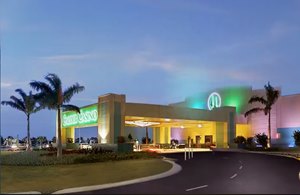Florida Horsemen File Suit Over Calder Jai Alai Permit


The Florida Horsemen's Benevolent and Protective Association has filed a lawsuit questioning the validity of a permit that a state regulator issued to Calder Race Course that would allow the Churchill Downs Inc. track to conduct summer jai alai and abandon its commitment to Thoroughbred racing.
In the suit filed June 25 in Leon County Circuit Court—the county where state capital Tallahassee is located, the horsemen requested declaratory and other relief following the February decision by the state's Department of Business and Professional Regulation, Division of Pari-Mutuel Wagering's to award Calder a summer jai alai license.
While Calder has leased its racing operations to Gulfstream Park, which conducts the Gulfstream Park West meeting on the Calder property; as part of its casino license, the track continues to annually commit about $10 million to the purse fund and state breeders from its gaming revenues. If its casino license were tied to summer jai alai, Calder could eliminate its payments to Thoroughbred racing and breeding.
In its court filing, the Florida HBPA argues that the summer jai alai permit granted to Calder should not have existed to begin with, based on state law. It also suggests that the DPMW acted improperly in its procedures in granting the license.
Requests from Bloodhorse.com for comment from both Churchill Downs Inc. and the DPMW Sept. 27 were not answered.
In its lawsuit, the Florida HBPA contends that the division is allowed to authorize a summer jai alai permit under "extremely limited conditions." One of those conditions requires that one track operator with a pari-mutuel permit—Thoroughbreds, Standardbreds, Greyhounds, Quarter Horses, or Jai Alai—have the "smallest play or total pool" within its county for two consecutive years.
As part of that standard, the rule notes that if there is a qualifying permit holder under the two-year standard who declines to convert to the summer jai alai license, a new permit is made available in that permit-holder's county to all pari-mutuel operators.
Under this standard, the DPMW determined a permit was available. It says that in fiscal years ending in 2006 and 2007 Flagler qualified under the two-year lowest handle standard. Because Flagler qualified but didn't apply for a summer jai alai permit, a summer jai alai permit became available that others tracks in the Miami-Dade County could pursue.
The Florida HBPA argues that the DPMW did not use the proper standard in determining who had the lowest pools in the state for those two years. It argues that millions of dollars were not counted for Flagler because the DPMW didn't include wagers placed at Flagler on incoming signals. It says if all of this handle is counted, the lowest handle in FY2006 was Summer Jai Alai and the lowest in FY2007 was Bet Miami greyhounds.
The horsemen also argue that, even based on the DPMW's position that Flagler qualified in those two years ending in FY2007, it should have no longer been available when Calder applied Aug. 31, 2017. In its filing, the Florida HBPA notes that, "the general statute of limitations for any action not specifically provided for ... is four years."
The horsemen also are raising state constitutional questions in how the license was awarded. Its court filing says that the regulator was required to provide interested parties notice that such changes were being considered. The Florida HBPA said it was unaware of Calder's jai alai permit request until after it was approved and it was not afforded a public hearing, which it says it is entitled.
Under state law, the casinos at Gulfstream Park and Calder both pay into a single Thoroughbred purse fund, a commitment of 10% of their slot machine revenues. In the lawsuit, the Florida HBPA said in fiscal year 2017-2018, Calder paid $8.82 million to purses. Florida HBPA attorney Brad Beilly noted that Calder would commit about another $1 million to state breeders.
CDI currently holds pari-mutuel licenses for both jai alai and Thoroughbred racing at Calder, but the latter will expire in 2020. On July 31, Calder submitted an email to the DPMW requesting a declaratory statement from the regulator about whether a switch to jai alai would jeopardize its casino license.
In a joint release in August, Gulfstream Park, the Florida Thoroughbred Breeders' and Owners' Association, and the Ocala Breeders' Sales Company each expressed opposition to CDI ending racing in favor of jai alai.
The Florida FTBOA noted that voters approved casino gaming at Calder with the understanding that it would support Thoroughbred racing. It said that support has allowed CDI to successfully operate slot machines at its Calder property since 2010.
